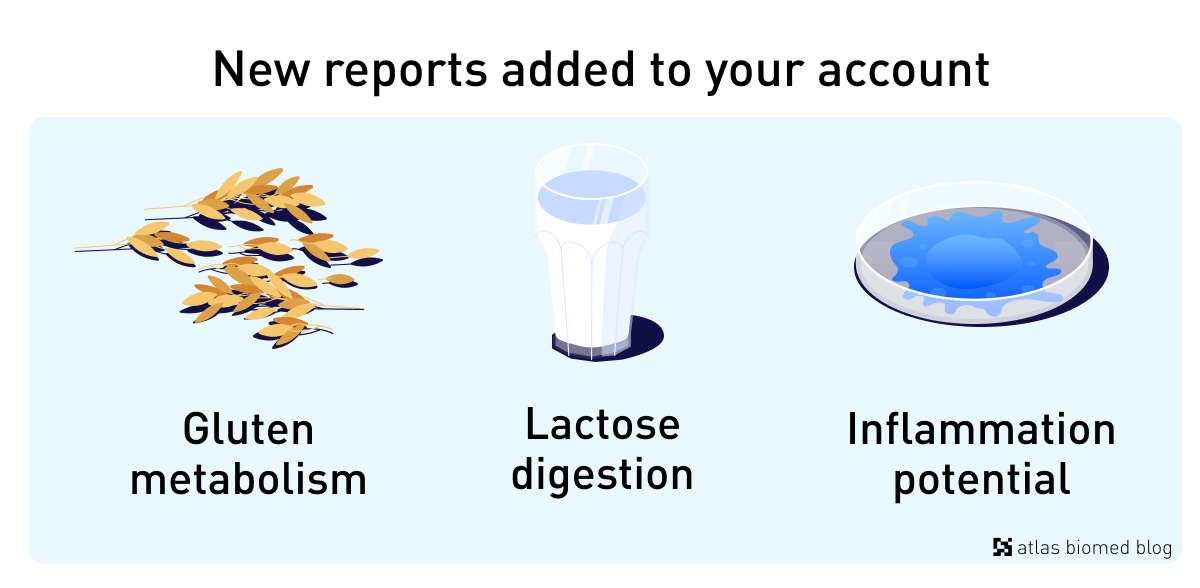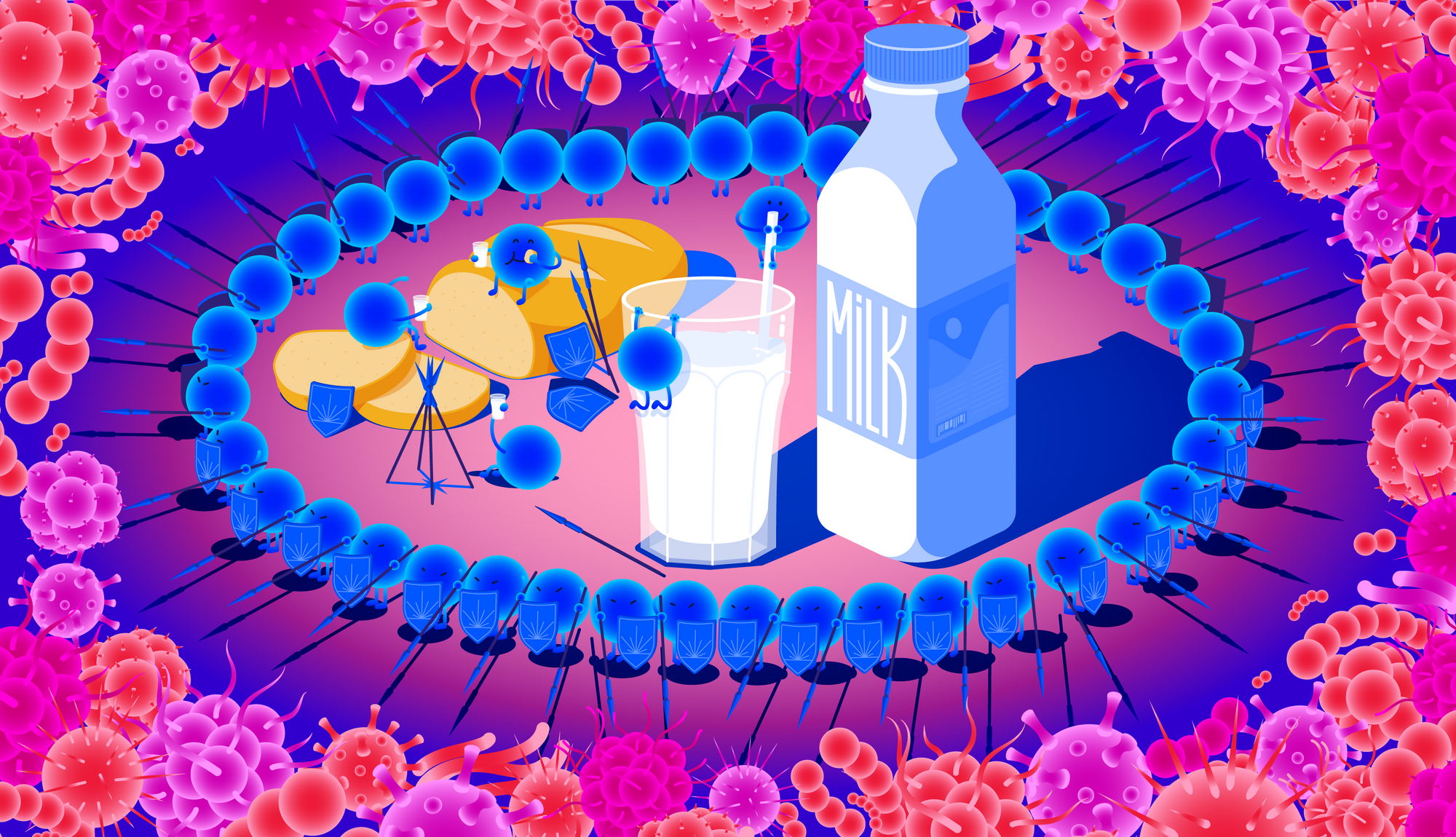Discover how your gut microbiome influences inflammation, gluten and lactose metabolism with the brand new Atlas Microbiome Test reports.
The microbiome is a fascinating new organ that has captivated the attention of researchers thanks to its far-ranging effects on human health. Now, there are enough studies to show how your gut bacteria specifically influence gluten reactions, lactose sensitivity, and inflammation.

As you read this, there are trillions of bacteria breaking down the leftovers in your gut, and that may have knock-on effects for how you feel. Now you’ll have even more insight into the inner workings of your bacteria after months of work by our team of microbiome researchers.
Table of contents
The gut microbiome and gluten
Gluten is the name given to a group of proteins (gliadin and glutenin) found in wheat, rye, and barley. Although wheat (and bread) have fed humans since the dawn of civilisation, nowadays, more people are suffering from gluten intolerance (also known as coeliac disease), and gluten sensitivity.
- Coeliac disease is a serious autoimmune disorder triggered by exposure to gluten.
- Non-celiac gluten sensitivity manifests with digestive symptoms, but no intestinal damage.
Recent studies have revealed a novel association with the actions of specific gut bacteria on glutenin and gliadin. Depending on which microbes break down gliadin, it can be turned into harmless molecules or peptides that trigger the immune system.
On the plus side, members of the Lactobacillus and Bifidobacterium genera break down gliadin completely. Sadly, bacteria of the Pseudomonas aeruginosa species group don’t, and they leave byproducts that are associated with intestinal inflammation.
- ☝ Find out what your Atlas Microbiome Test says about gluten metabolism, and whether your bacteria are doing more to help or harm in your personal account.
The gut microbiome and lactose
Lactose is a naturally-occurring sugar found in milk and dairy products. The body digests lactose with the help of an enzyme called lactase, which is especially abundant in babies since milk is their main food source.
Later in life, many adults find that dairy products cause abdominal symptoms like bloating, pain, gas, and diarrhea. This is known as lactose intolerance, and it happens when the body stops producing enough lactase to effectively break down lactose.
Lactose intolerance is primarily a genetic trait, but recent studies show that gut bacteria also play a role in how well the body tolerates milk and dairy products. Specific microbes are able to break down and absorb lactose, even in people with lactose intolerance:
| Lactobacillus | Bifidobacterium |
| Faecalibacterium | Roseburia |
This is, in part, made possible by a specific fiber found in food: galactooligosaccharides (GOS). GOS are prebiotic molecules that nourish the beneficial bacteria in your gut, and studies show that, by doing so, they can also alleviate the symptoms of lactose intolerance.
- ☝ If you have trouble digesting dairy products, head to your personal account and find out what your Atlas Microbiome Test says about your bacteria and lactose metabolism.
The gut microbiome and inflammation
Inflammation is an immune response to injury, invaders, and foreign bodies. Its goal is to attract immune cells to the problem area so they can go about healing it. Chronic low-grade inflammation, which is invisible to the naked eye, is a more insidious type of inflammation.
Low-grade inflammation happens when the immune system constantly receives signals that something is not quite right, and keeps on sending out immune cells to fix the problem. This type of invisible inflammation plays a role in serious diseases, including inflammatory bowel disease, obesity, heart disease, and diabetes type II.
Your microbiome can encourage or prevent inflammation inside your gut. Some microbes have anti-inflammatory functions. Unfortunately, others are pro-inflammatory, meaning they can encourage inflammation.
Anti-inflammatory bacteria
- Lactobacillus
- Bifidobacterium
- Faecalibacterium
- Akkermansia muciniphila
Beneficial and probiotic microbes prevent inflammation in many ways. They produce short-chain fatty acids, like butyrate, which is an anti-inflammatory molecule that fuels the cells of your gut lining.
In addition to maintaining the integrity of your intestinal barrier, they also maintain the correct acidity in your gut and produce special molecules that deter bacteria, which can cause inflammation.
Pro-inflammatory bacteria
Some bacteria naturally induce inflammation with pro-inflammatory molecules, known as endotoxins. For example, the outer membranes of gram-negative bacteria, such as Klebsiella or Citrobacter, have LPS (lipopolysaccharides), which are endotoxins.
When these microorganisms die (remember that bacteria have very short life spans), LPS enter the bloodstream. When this happens, it spreads the risk of inflammation to your whole body – something doctors refer to as “systemic inflammation”.
High levels of bacterial lipopolysaccharides have been linked to many diseases and health problems, from diabetes and liver damage to Parkinson’s and Alzheimer’s disease. Studies also show that LPS from the gut increase the risk of heart disease.
Pro- and anti-inflammatory balance
The goal is not to eradicate pro-inflammatory bacteria, rather it is to achieve long-term balance between pro- and anti-inflammatory microbes. That’s because your microbiome is dynamic and it is constantly adapting to your health, lifestyle choices, and even stress levels.
By making sure your diet contains lots of prebiotic foods (fruit, veg, whole grains, legumes), getting regular exercise, and generally striving for a relatively healthy lifestyle, you can help your microbiome prevent low-grade systemic inflammation.
- ☝ Check your Atlas Microbiome Test results to see how well your gut bacteria defend against inflammation in the personal account.
Where to find the new reports
These new reports are located in the Nutrition section of your Atlas Microbiome Test results. Your recommendations have been updated to include foods that encourage lactose and gluten metabolism, and anti-inflammatory functions by your bacteria.
If you took the test more than three months ago, your results are too old to accurately reflect your current health status, especially if you are sick or have changed your diet.
- ☝Subscribe to the blog and get 10% off your next Atlas Microbiome Test!
















